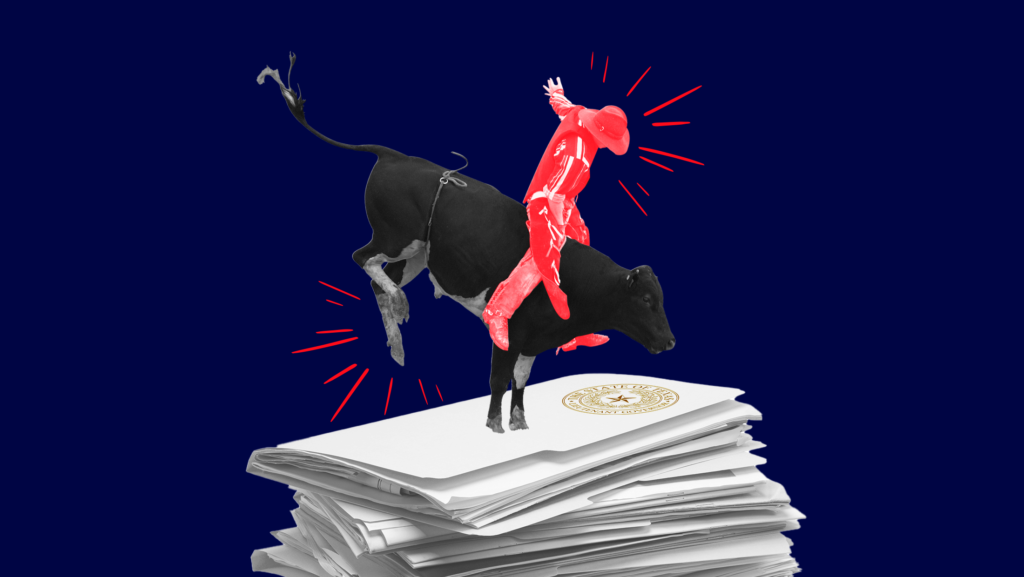Five Texas Voter Suppression Laws You Might Have Missed

If you’re following voting rights news this week, there’s probably one state at the front of your mind: Texas. Texas has the most restrictive voting rules in the nation — yet Republicans in the state made passing even more voter suppression bills a top priority after the 2020 general election. Thanks to the coordinated efforts of Texas Democrats, Republican legislators were not able to pass their omnibus voter suppression law, Senate Bill 7, during the last legislative session in the spring of 2021. And the fate of a new iteration of the bill hangs in the balance after Texas Democrats walked out of the special session Gov. Greg Abbott (R) called specifically to pass “election security” measures.
Stopping this omnibus bill is rightly a high priority for Democrats and advocates who want to expand voting rights in the state. But while all eyes were on S.B. 7 last session, Texas Republicans successfully enacted smaller, standalone laws that chip away at equal access to the right to vote. These laws make voting harder at all stages of the process — and reflect the wide-ranging and multi-pronged effort that Republicans are pursuing to make it harder for their constituents to cast a ballot.
Here are the Texas voter suppression bills that were signed into law this year:
S.B. 1111
S.B. 1111 prohibits establishing residence “for the purpose of influencing the outcome of a certain election,” restricts individuals from registering to vote using an address where they don’t live full time (targeting students and homeless voters) and adds strict voter identification requirements for voters that use P.O. boxes to register to vote.
H.B. 3107
H.B. 3107 requires individuals who submit their registration applications electronically or through fax to provide a copy of their application with their original signature signed with pen on paper — also known as a “wet-ink signature.”
S.B. 1113
S.B. 1113 allows the Texas secretary of state to withhold state funds from registrars if they do not regularly purge voter registrations.
H.B. 3920
H.B. 3920 lays out new limitations on who can request a mail-in ballot and for what reasons, including limiting what qualifies as a disability and requiring disabled voters who request a mail-in ballot to affirm their eligibility by signing a statement attesting to their physical inability to vote at the polls.
H.B. 2283
H.B. 2283 limits donations to election administrators — a response to nonprofit organizations such as the Center for Tech and Civic Life that provided grants to support election administration costs during the 2020 election after Republicans refused to adequately fund election infrastructure.
Some of these laws are also already facing lawsuits: Vote.org filed a suit challenging H.B. 3107’s wet signature requirement, and the Texas State League of United Latin American Citizens and Voto Latino are in court fighting S.B. 1111’s residency restrictions.
Although these new laws are key successes for Republicans’ voter suppression agenda, voting rights groups are fighting to stop them from going into effect and harming voters in the next election. And, although these suppression bills have been signed into law, they would be significantly impeded if Congress passes federal voting rights legislation such as the For the People Act.
While these laws are being challenged, it’s important to remember the scale of Republican ambitions to suppress voters. Five voter suppression laws passed in Texas last session — but dozens more were proposed by Republican legislators, each attempting to further restrict ballot access in new and shocking ways.
Here are just a few bills that failed to make it out of legislative debate in Texas:
H.B. 4507
H.B. 4507 would have created a two-tiered voter registration system in an effort to evade federal voting rights protections. The bill would have established two different registration processes: one for federal elections, which would be required to comply with national legislation such as the For the People Act, and one for state elections, which Texas Republicans claim could ignore these federal requirements. Voters would have had to register for each type of election separately.
H.B. 2293
H.B. 2293 would have effectively banned 24-hour early voting and only allowed early voting between 6 a.m. and 9 p.m. — a move explicitly designed to target urban centers like Harris County, which successfully ran 24-hour voting locations last year and saw significant increase in voter turnout.
H.B. 2293
H.B. 3080 would have required any voters wishing to cast a mail-in ballot to submit their thumbprint as a form of identity verification.
H.B. 4459
H.B. 4459 would have made it a felony for election officials to print straight-ticket voting ballots. Ballot designs that allow voters to select all the candidates from one party at once are disproportionately used by Democratic voters. Texas Republicans were sued in 2020 over their previous efforts to eliminate straight-ticket voting.
The legislative session ended before these bills could advance to the governor, which means they are dead — for now. But it is clear that Texas Republicans will go to extreme ends to make it harder for their constituents to make their voices heard.
As you watch the current special session and keep track of the new omnibus suppression bill that Republicans are pushing, remember that suppressive provisions have already been successfully enacted in the state this year, and that the legal challenges against them that are currently being litigated will have a significant effect on the state’s next elections.